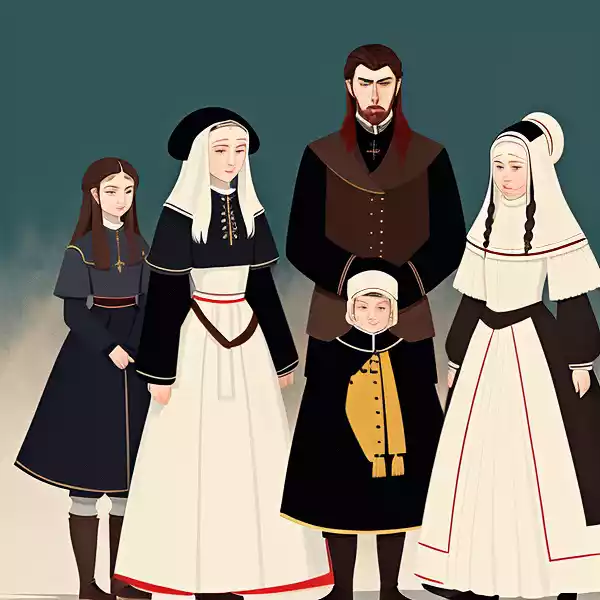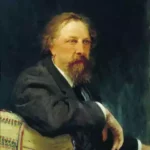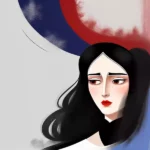 | |
The Family of the Vourdalak | |
| Author | Alexei Tolstoy |
|---|---|
| Published |
1839
|
| Language | English |
| Original Language | Russian |
| Nationality | Russian |
| Genre | Historical Fiction, Russian Literature |
1839 Short Story
The Family of the Vourdalak
The Family of the Vourdalak is an English Historical Fiction, Russian Literature short story by Russian writer Alexei Tolstoy. It was first published in 1839. The Family of the Vourdalak is a gothic novella written in French in 1839, but not published until 1884. The word "Vourdalak" was referenced by Alexsander Pushkin in his earlier work, referring to vampires or werewolves from Slavic or Balkan folklore. The original text is in French. We present the text here with kind permission by Nina Zumel, who made and posted an English translation at her blog, Multo (Ghost) where she provides excellent background. We feature this story in our Gothic, Ghost, Horror & Weird Library.
The Family of the Vourdalak
by Alexei Tolstoy
In the year 1815 all the great heads of Europe were gathered in Vienna: the continent’s brightest minds and most brilliant diplomats. Our tale begins towards the conclusion of this historic Congress.[1]
The royalist emigres were preparing to return to their chateaus, and the Russian warriors to return to their forsaken homes. A few disgruntled Poles hoped to shelter their desire for freedom under the dubious independence granted to Krakow by Prince Metternich, Prince Hardenberg and Count Nesselrode.[2]
It was like the waning hours of a lively ball. The once vibrant crowds that filled the streets and establishments of the city had dwindled to a small number of people still seeking diversion, still fascinated by the charms of the Austrian ladies, reluctant to pack up and go their separate ways.
This pleasant company, of which I was part, would meet twice a week in the castle of the Dowager Princess of Schwarzenberg, a few miles from the city, beyond a small village named Hitzing. Our hostess’ aristocratic manner, her gracious kindness, and the nobility of her spirit and of her intellect, made our soujourns to her castle quite agreeable indeed.
Our mornings were spent on pleasant rambles; in the afternoon we dined together in the castle or within its environs. In the evenings, sitting by a good fire, we amused ourselves in conversation and story-telling. Discussion of politics was strictly forbidden everyone had had enough. The stories we told were borrowed from the legends of our respective countries, or from our own memories.
One evening everyone had been telling ghost stories, and our minds were in a restless, uneasy state that was increased by the evening’s darkness and silence. The Marquis d’Urfé, an old emigre whom we all loved for his youthful gaiety, and for the colorful stories he told of his adventures and various changes of fortune, took advantage of a moment of silence and spoke:
“Your stories, gentlemen,” he said, “are no doubt amazing, but in my opinion they lack an essential quality I mean that of authenticity. I don’t think that any of you have seen with his own eyes the wonderful things that you narrate, nor can you atttest to their truth with your word as gentlemen.”
This we were obliged to admit, and the old man continued, straightening his cravat:
“As for me, gentlemen, I have had but a single adventure of this kind; but it is so strange, so horrible, and yes true, that it will strike terror in even the most incredulous among you. I was unfortunately both witness and actor, and I though I normally don’t like to remember it, I would be happy to tell you the story, if it pleases the ladies to allow me.”
The approval was unanimous. A few of us glanced nervously around at the moonlit tiles of the parquet floor, and our circle drew closer to listen to the Marquis’ tale. M. d’Urfé took a pinch of snuff, sniffed and slowly began with these words:
“First of all, mesdames, I beg your pardon if I mention the affairs of my heart more often in my story than a man my age should, but the romance is an essential part of the narrative. Besides, old age has its moments of forgetfulness and it’s your fault, mesdames, that you are all so beautiful that I forget that I’m no longer a young man. So let me begin.
“In 1759, I was madly in love with the beautiful Duchess de Gramont. This passion, which seemed so deep and enduring at the time, gave me no rest day or night, and the way that the Duchess played the coquette as many beautiful women do only added to my torment. Finally, in a moment of despair, I sought out and obtained a diplomatic mission to the Gospodar [Lord] of Moldavia, who was in negotiations with Versailles over business that it would bore you to hear about. On the eve of my departure, I presented myself to the Duchess. She received me less teasingly than usual, and said to me, with some emotion:
“‘D’Urfé, you are committing a great folly. But I know you and I know you’ll never change your mind. So I ask you only one thing: please accept this small cross as a token of my friendship, and carry it with you until you return. It’s a family relic that we value highly.’
“With a gallantry that was perhaps misplaced at such a moment, I kissed not the relic, but the charming hand that she gave me, and I passed the cross around my neck, and have worn it ever since.
“I won’t bore you, mesdames, with the details of my trip, or with my observations of the Hungarians and Serbs, those poor but brave and honest people. Even enslaved by the Turks, they never forgot their dignity or their former independence. Suffice it to say that having learned a little Polish during a visit I made to Warsaw, I was also able to acquire a bit of Serbian, as these two languages (and Russian and Bohemian as well) are, as you probably know, so many branches of a single language called Slavonic.
“And so I knew enough of the language to make myself understood, when one day I arrived in a village whose name will not interest you much. I arrived on a Sunday, a day which the Serbian people generally devote to amusements like dancing, sharpshooting, wrestling, and so on. So you can imagine my surprise when I reached the house where I planned to stay, and found the inhabitants in an extremely anxious state. Guessing that the situation was due to some recent misfortune, I started to withdraw from the house when a man of about thirty, a tall and imposing figure, approached me and took me by the hand.
“Enter, stranger, please, come in,” he said. “Don’t be alarmed at our sorrow; you’ll understand when you know the cause.”
“He then told me that, on rising one morning several days before, his elderly father, Gorcha, a restless and stubborn man, had taken from the wall a long Turkish musket.
“‘Children,’ he said to his two sons, one named Dorde, the other Petar,[3] ‘I’m going up to the mountains to join the brave men who are chasing this dog Alibek (this was a Turkish robber who had been ravaging the countryside for some time). Wait for me for ten days, and if I don’t return by the tenth, have a Mass said for my soul, because I’ll be dead.’
“Then old Gorcha added, in a deadly serious tone, ‘But if God forbid I come back after ten days, for your own sakes do not let me in. If this happens, I command you to forget that I was your father, no matter what I say or do, and to impale my heart with an aspen stake, because I will be a cursed Vourdalak returning to suck your blood.’
“I should explain to you, mesdames, that vourdalaks, as the Slavic peoples call vampires, are believed in those countries to be dead bodies that come out of their graves to suck the blood of the living. Their habits are similar to those of all vampires, from any country, but they have one characteristic that makes them even more dreadful. The vourdalaks, mesdames, prefer to suck the blood of their closest relatives and dearest friends who, once dead, become vampires in turn. They claim that in Bosnia and Hungary entire villages have become vourdalaks. Father Augustin Calmet, in his curious book on ghosts and apparitions, cites many frightening examples. Several times, the Emperors of Germany have appointed commissions to investigate outbreaks of vampirism. The commissioners tell of exhuming bodies engorged with blood, which they stake in the heart and then burn in the village squares. The magistrates who were present at these executions attest with oaths and signed statements that they heard the dead howl at the moment that the stake was plunged into their hearts.
“Knowing this, it will be easy to understand, mesdames, the effect that old Gorcha’s words had on his sons. They both threw themselves at his feet and begged him to let them go in his place. In reply, he turned his back and left, humming the refrain of an old war song. The day I arrived in the village was precisely the end of the ten days, which of course explained his family’s concern.
“They were a good and honest family. Dorde, the eldest son of the two, seemed a serious and resolute man. He was married with two children. His brother Petar, a handsome young man of eighteen years, had a face full of gentleness and courage, and was evidently the favorite of their younger sister, Sdenka, a classic Slavic beauty. I was struck not only by Sdenka’s undeniable loveliness, but also by a certain resemblance she had to the Duchess de Gramont. They both had a delicate line on their foreheads,[4] a characteristic that I’ve only ever noticed on these two women. This feature may not seem very appealing at first, but the more you noticed it, the more irresistible it became.
“Perhaps it was because I was so young then, but this resemblance, combined with Sdenka’s charming and naive air, was truly irresistible. I had only known Sdenka for two minutes, but already I felt a sympathy for her that threatened to become a more tender emotion if I lingered too long in the village.
“We were all gathered in front of the house, around a table topped with cheese and bowls of milk. Sdenka spun, her sister-in-law was preparing supper, the children were playing in the sand. Petar whistled nonchalantly as he cleaned his yatagan, or Turkish longknife. Dorde sat silently with his elbows on the table and his head in his hands. His eyes devoured the highway.
“I felt overcome by the general melancholy, and could only watch sadly as the evening clouds framed the golden background of the sky and the silhouette of a monastery[5] half hidden by the black pine forest.
“This monastery, as I learned later, had once been famous for a miraculous image of the Virgin, which according to legend, was brought by angels and placed on an oak . But when the Turks invaded the country at the beginning of the last century, they slaughtered the monks and ransacked the monastery. All that was left were the walls, and a chapel served by a mysterious hermit. He gave tours of the ruins to the curious, and sheltered pilgrims who, as they traveled on foot from one holy site to another, liked to stop at the Shrine of Our Lady of the Oak. As I said, I learned this all much later; that night I had other things on my mind besides Serbian archeology. As often happens when you let your mind wander, I thought back to times past, to my childhood, to the beautiful France that I had left behind for this remote, wild country.
“I thought of the Duchess de Gramont, and why not admit it? I also thought of other ladies, contemporaries of your grandmothers, whose images, without my knowledge, had crept into my heart, following the image of the lovely Duchess.
“Soon I had forgotten my hosts and their worries.
“Suddenly Dorde broke the silence.
“‘Woman,’ he asked his wife, ‘what time did the old man leave?’
“‘At eight o’clock,’ his wife answered. ‘I heard the monastery bell.’
“‘Good,’ said Dorde, ‘it can’t be later than half past seven.’ And he fell silent, fixing his eyes again on the highway which disappeared into the forest.
“I forgot to tell you, mesdames, that when the Serbs suspect someone of vampirism, they avoid calling him by name or referring to him directly, for fear it will summon him from the grave. So for some time, when speaking of his father, Dorde had only called him the old man.
“A few moments of silence passed. Suddenly one of the children tugged on Sdenka’s apron.
“‘Auntie, when is Grandpa coming home?’
“A blow from Dorde was the answer to this untimely question.
“The child began to cry, but his brother said, with an expression of surprise and fear:
“‘Father, why can’t we ask about Grandpa?’
“Another blow silenced the child. The two children began to bawl, and the rest of the family crossed themselves.
“At this point, I heard the monastery clock begin slowly to strike eight. Hardly had the first chime sounded in our ears than we saw a human form emerge from the woods and advance towards us.
“‘That’s him! God be praised!’ cried Sdenka, Petar, and their sister-in-law at once.
“‘God keep us!’ Dorde said solemnly. ‘How do we know if the ten days have passed or not?’
“Everyone looked at him fearfully. Still the figure advanced towards us. He was a tall old man with a silver mustache, and a pale, stern face, limping painfully along with a stick. As he approached, Dorde’s face became darker. When the newcomer was near us, he stopped and surveyed his family with eyes that seemed to look right through them, they were so dull and sunken in their sockets.
“‘Well,’ he said in a hollow voice, ‘no one stands up to greet me? What is this silence? Don’t you see that I’m hurt?’
“I then noticed that the the old man’s left side was bloodied.
“‘Help your father,’ I said to Dorde, ‘and you Sdenka, bring him some spirits, he’s about to faint!’
“Father,’ Dorde said, as he approached Gorcha, ‘show me your injury, I will try to help you ’
“He tried to open Gorcha’s coat, but the old man pushed Dorde away roughly, holding both hands over his side.
“‘Clumsy oaf,’ he said, ‘you’re hurting me!’
“‘You’ve been wounded near the heart!’ cried Dorde, his face pale. ‘Take off your coat, now, you must, I tell you!’
“The old man stood up straight and stiff.
“‘Watch yourself,’ he said in a low voice. ‘If you touch me, you’ll regret it!’
“Petar got between Dorde and his father.
“‘Let him be,’ he said. ‘Can’t you see he’s in pain?’
“‘Don’t defy him,’ said Dorde’s wife.’You know he won’t tolerate that!’
“At that moment we saw a cloud of dust: it was the herd returning home from their grazing. Perhaps the dog that accompanied them didn’t recognize her old master, or maybe she was agitated for other reasons, but as soon as she saw Gorcha she stopped, hair bristling, and began to growl as if she saw something uncanny.
“‘What is wrong with that dog?’ said the old man, looking more and more annoyed. ‘What does all this mean? Have I become a stranger in my own home? Have ten days in the mountains changed me so much that my own dogs don’t recognize me?’
“‘Do you hear?’ Dorde said to his wife.
“‘What?’
“‘He admits that the ten days have passed!’
“‘But didn’t he return at the appointed time?’
“‘Yes, well, I know what has to be done.’
“The damned dog is still barking! Kill it!’ cried Gorcha. ‘Well, did you hear me?’
“Dorde did not move, but Petar stood up with tears in his eyes, and seizing the musket from his father, he shot the dog, who fell, rolling in the dust.
“‘She was my favorite dog,’ Petar whispered. ‘I don’t know why Father wanted her killed!
“‘Because that’s what she deserved.’ said Gorcha. ‘It’s getting cold, I want to go inside!’
“While this was going on outside, Sdenka had prepared for the old man a drink made from pears, honey and raisins, but her father refused it in disgust. He showed the same aversion to a mutton rice dish that Dorde offered him, and went to sit by the hearth, muttering between his teeth unintelligibly.
“A pine fire crackled in the fireplace, casting its flickering light on the figure of the old man, who was so pale that without the fire’s glow, he could have been taken for dead. Sdenka sat down beside him.
“‘Father,’ she said, ‘you don’t want anything to eat, and you don’t want to rest. Perhaps you can tell us your adventures in the mountains?’
“The girl knew that she could get on his good side by asking that, because the old man liked to talk about his battles and exploits. A kind of smile appeared on his colorless lips, though without reaching his eyes. He ran his hand through her beautiful blond hair.
“‘Yes, my daughter, yes, Sdenka. I will tell you what happened to me in the mountains, but some other time, because I’m tired today. But I will tell you that Alibek is no more and that it was by my hand he perished. If anyone doubts this,’ continued the old man, looking around at his family, ‘here is the proof!’
“He opened a bag that hung behind the two of them, and pulled out a head, pale and bloody though not quite as pale as his own. We turned away in horror, but Gorcha handed it to Petar.
“‘Here,’ he said, ‘hang it over the door, so that everyone who passes will know that Alibek is dead and the roads are purged of robbers except of course, the Sultan’s Janissaries!'[6]
“Petar obeyed, picking up the head with revulsion.
“‘Now I understand,’ he said. ‘The poor dog that I killed was upset because she smelled dead flesh!’
“‘Yes, she smelled dead flesh.’ replied Dorde gloomily. He had slipped away without anyone noticing, and now he entered the house, holding in his hand an object that he placed in a corner and which looked to me like a stake.
“Dorde,’ his wife said in a low voice, ‘you don’t intend, I hope ’
“‘My brother,’ said his sister, ‘what are you planning to do? But no, you won’t do anything, will you?’
“‘Let me be,’ said Dorde, ‘I know what I have to do, and I won’t do anything that isn’t necessary.’
“When night fell, the family went to bed. The part of the house where they slept was separated from my room by a very thin wall. I confess that what I’d observed that evening had affected my imagination. With the lights out, the full moon shone into the room through a small low window close to my bed, casting a pale glow on the floor and walls much as it does now, mesdames, in this room where we sit. I tried to sleep, but couldn’t. I attributed my insomnia to the moonlight, and I looked for something to serve as a curtain over the window, but I found nothing. Then, hearing muffled voices behind the wall, I began to listen.
“‘Go to bed, woman,’ said Dorde. ‘And Petar and Sdenka, you too. Don’t worry about anything, I’ll keep watch.”
“‘No, Dorde,’ said his wife. ‘I should watch; you worked until late last night, and you must be tired. Besides, I have to watch our oldest. You know he’s been ill since yesterday!’
“‘Be quiet and go to bed,’ said Dorde. ‘I’ll keep watch for both of us!’
“‘But brother,’ said, Sdenka in her softest voice. ‘There’s no need to watch. Father is already asleep see how calm and peaceful he looks!’
“‘You don’t know what you’re talking about, either of you,’ Dorde said in a tone that brooked no argument. ‘I told you to go to bed and let me watch!’
“There fell a profound silence. Soon I felt my eyelids droop and sleep overcame me.
“I thought I saw my door open slowly, and old Gorcha appear on the threshold. It was very dark in that corner of the room; I couldn’t really see him, but only suspected that the figure was his. His eyes followed the movement of my breath, and seemed to be trying to guess my thoughts. Cautiously, he crept towards me, on tiptoe. Suddenly he loomed above me, at the side of my bed. I felt an inexpressible fear, but some invisible force held me there, immobile. The old man leaned over me, his livid face so close to mine that I thought I could feel his cadaverous breath. With a supreme effort, I forced myself awake, bathed in sweat. There was no one in my room; but glancing out the window, I clearly beheld old Gorcha with his face against the pane, staring at me with dreadful eyes.
I had the strength to suppress a scream, and the presence of mind to lie calmly, as if I had not seen anything. However, it seemed the old man only wanted to make sure that I was asleep, because he made no attempt to get in, but walked away from the window after scrutinizing me. I heard footsteps in the next room. Dorde was asleep, snoring to shake the walls. The child coughed at that moment and I could make out Gorcha’s voice.
“‘You’re not sleeping, little one?’ he said.
“‘No, Grandpa,’ said the child, ‘and I want to talk to you!’
“‘And what shall we talk about?’
“”I want you to tell me how you fought the Turks. I want to go fight the Turks, too!’
“‘Yes, I thought so, child, and I brought you a little yatagan that I’ll give you tomorrow.’
“‘Oh, Grandpa, give it to me now!’
“‘But why, my little one, did you not talk to me when it was daylight?’
“‘Because Father wouldn’t let me!’
“‘He’s cautious, your father. So you want to have your little yatagan?’
“‘Oh yes, I would! But not here, in case father wakes up.’
“‘But where then?’
“‘If we go outside, I promise to be careful and not make any noise!’
“I seemed to hear Gorcha chuckle, as the child got out of bed. I did not believe in vampires, but my nightmare had frayed my nerves; wanting nothing to reproach myself for later, I got up and slammed my fist against the wall between myself and the room where the others were.
The noise should have been enough to wake the Seven Sleepers,[7] but I heard no response. I rushed for the door, determined to save the child, but I discovered that it was closed and locked, and would not yield to my efforts to open it. As I tried in vain to escape, I could see the old man through my window, leaving with the boy in his arms.
“‘Get up, get up!’ I shouted with all my strength, pounding the wall, which shook with the force of my blows. Only then did Dorde wake up.
“‘Where’s the old man?’ he called.
“‘Quickly!’ I shouted at him, ‘he just took your son!’
“With a kick Dorde burst open the front door, which, like mine, had been barred from the outside, and ran in the direction of the woods. I finally managed to wake up Petar and Sdenka. We gathered in front of the house, and after a few minutes’ wait, we saw Dorde return, carrying his son. He’d found the boy unconscious by the side of the road. The child soon recovered, and seemed no worse for the experience. To our questions, he said that his grandfather had done him no harm; they had gone outside together to be more at ease. Once outside, he had lost consciousness, without remembering how. As for Gorcha, he was gone.
“The rest of the night, as you might imagine, passed without sleep.
“The next day I learned that the Danube, which cut the main road a mile from the village, had begun to freeze over, which always happens in that region in the late fall and early spring. This prevented travel for a few days, and I had to delay my planned departure. Yet, even if I could have left, curiosity, combined with a more powerful attraction, would have kept me there. The more I saw Sdenka, the more I loved her. I am not one of those romantics, mesdames, who believe in the sudden and irresistible passion that we read about in novels, but I think there are cases where love blossoms more quickly than usual. Sdenka so remarkably reminded me of the Duchess de Gramont, with that faint line traced on her forehead the same line that, in France, had made me suicidal with longing. I’d fled Paris to escape her, and yet here she was again, in picturesque costume and speaking a harmonious foreign tongue. It was this resemblance, together with the strangeness of my situation and the mysteries that surrounded me, that kindled in me a desire that, in other circumstances, would have been vague and fleeting.
“In the course of the day I overheard Sdenka talking to her younger brother.
“‘What do you think of all this?’ she asked him. ‘Do you also suspect our father?’
“‘I dare not suspect him,’ replied Petar, ‘especially since the boy said that he wasn’t hurt. As for Father’s disappearance, you know that he never tells us of his comings and goings.’
“‘I know,’ Sdenka said, ‘but something must be done, because you know Dorde ’
“‘Yes, I know. It would be useless to try and talk him out of it, but if we hide the stake, he can’t get another one, because there’s not a single aspen on this side of the mountains!’
“‘Yes, let’s hide the stake, but don’t tell the children because they might tell Dorde!’
“‘We’ll keep it to ourselves,’ said Petar. And they parted.
“Night came; still no news of old Gorcha. I lay awake, sprawled out on my bed, watching the moon shining brightly into my room. As sleep began to blur my thoughts, I suddenly felt, as if by instinct, the old man’s approach. I opened my eyes and saw his ghastly face pressed against my window.
“This time I tried to get up, but it was impossible. It seemed as if all my limbs were paralyzed. After watching me carefully, the old man slipped away. I heard him go around the house and gently tap at the window of the room where Dorde and his wife slept. The child rolled over in his bed and moaned in his sleep. A few minutes of silence passed, then again I heard a knock at the window. The child moaned again and woke up …
“‘Is that you, Grandpa?’ he asked.
“‘It’s me’, a low voice replied. ‘I’ve brought your little yatagan.’
“‘But I daren’t go out; Father’s forbidden me to!’
“‘You needn’t go out, just open the window so you can come kiss me!’
“‘The child got up and I heard him open the window. Calling upon all my energy to break my paralysis, I jumped out of bed and pounded on the wall. In a minute Dorde was awake. I heard him swear; his wife shrieked. Soon the whole house was gathered around the unconscious child. Gorcha had disappeared again. Our ministrations managed to revive the child, but he was weak and could hardly breathe. The poor boy did not know why he had fainted. His mother and Sdenka blamed it on the fear of being caught talking to his grandfather. I said nothing. After the child grew quiet, everyone except Dorde went back to bed.
“Toward dawn I heard him wake his wife; the two talked quietly. Sdenka joined them and I heard the two women sobbing.
“The child was dead.
“I needn’t speak of the family’s despair. No one yet attributed the death to old Gorcha. At least, no one spoke of it openly.
“Dorde was silent, but his still, dark expression had taken on a terrible quality. For two days, the old man did not reappear. On the night after the third day (the day of the child’s funeral) I thought I heard footsteps around the house, and a voice of an old man who called out to the deceased boy’s younger brother. For a moment, I seemed to see Gorcha’s figure outlined against my window, but I could not tell if it was reality or my imagination, because that night, the moon was covered by clouds. In any case, I thought it my duty to tell Dorde. He asked the boy, who replied that, yes, he had heard his grandfather calling him, and had seen him looking through the window. Dorde sternly ordered his son to wake him if the old man appeared again.
“‘Even all these circumstances did not stop my love for Sdenka from growing even more.
“In the day, I couldn’t speak with her without the others overhearing. When night came, the thought of my imminent departure pierced my heart. Sdenka’s room was separated from mine by a passage that overlooked the street on one side and the courtyard on the other.
“One evening, as the household retired for the evening, I decided to take a walk in the countryside to distract myself before sleeping. As I passed through the passage from my room, I saw that Sdenka’s door was ajar.
“I stopped involuntarily. The familiar rustling of her dress made my heart pound. I heard words sung in a whisper. It was the song of a Serbian king about to leave for battle, bidding his beloved farewell.
‘Oh, my young poplar,’ said the old king,
‘I’m off to war and you will forget me!’
‘Your waist is more lissom than the slender young trees
that grow at the foot of the mountain.
‘Your lips are redder than rowan-berries.
‘And I, I’m like an old oak stripped of leaves;
my beard is whiter than the foam of the Danube!
‘You will forget me, O my soul, and I shall die of grief,
for the enemy will not dare to kill the old king!’
And the beautiful maid replied:
‘I swear to be faithful to you and to never forget you.
‘And if I break my oath, may you wake from the dead
to suck all the blood from my heart!’
And the old King said: ‘So be it!’
And he went to war. And how soon his lover forgot him! …
Here Sdenka stopped, as if she were afraid to finish the song. I couldn’t contain myself any longer. Her voice, so sweet, so expressive, was the voice of the Duchess de Gramont … Impulsively, I pushed open the door and entered. Sdenka had removed her overblouse; she wore nothing but a chemise embroidered in gold and red silk that clung to her waist, and a simple checkered skirt. Her beautiful blonde tresses were unbraided, and her undress made her appear even more ravishing. Instead of being irritated at my sudden entrance, she seemed confused and blushed slightly.
“‘What are you doing here? What will they think if they catch us?’
“‘Sdenka, my soul,’ I said, ‘don’t worry, everyone is asleep, only the crickets in the grass and the beetles in the air can hear us.’
“‘Oh, my friend, fly, fly! If my brother catches us, I’m lost!’
“‘Sdenka, I’ll go when you promise to love me forever, like the beautiful maiden promised her king in the ballad. I’m leaving soon, Sdenka, who knows when we shall meet again! I love you more than my soul, more than my salvation … my life and my blood are yours … can’t you give me one hour in exchange?’
“‘Many things can happen in an hour,’ Sdenka said, thoughtfully, but she left her hand in mine. ‘You don’t know my brother,’ she continued with a shudder, ‘I have a feeling he’ll find us.’
“‘Calm yourself, my Sdenka,’ I told her. ‘Your brother is tired from his day’s work, he sits drowsing to the sound of the wind playing in the trees; his sleep is deep, the night is long, and I only ask you for a single hour! And then, farewell … perhaps forever!’
“‘Oh, no, not forever!’ Sdenka cried, then recoiled as if afraid of her own voice.
“‘Oh, Sdenka,’ I cried, ‘when I see you, when I hear you, I can’t control myself I obey a superior force. Forgive me, Sdenka!’ And like a fool I pressed her to my heart.
“‘Oh, you’re not my friend!’ she said, breaking free of my arms and escaping deeper into her room. I don’t know how I replied to her, because I was confused by my audacity not that sometimes, on similar occasions, it hasn’t worked for me but despite my passion, I still had a sincere respect for Sdenka’s innocence.
“‘In fact, I started to regale her with those dashing phrases that had always worked so well for me with beautiful ladies, but then, ashamed of myself, I stopped. The girl’s simplicity kept her from understanding what I hinted at, though all of you ladies, as I see by your smiles, have easily guessed.
“So I stood there before her, unsure what to say, when suddenly I saw her flinch and stare at the window with a look of terror. I followed the direction of her eyes and distinctly saw the motionless figure of Gorcha, watching us from outside.
“At that moment, I felt a heavy hand on my shoulder. I turned. It was Dorde.
“‘What are you doing here?’ he asked.
“Rattled by his brusque question, I pointed to his father peering in at us through the window. Gorcha disappeared as soon as Dorde saw him.
“‘I heard the old man and I came to warn your sister,’ I said.
“Dorde’s stare bored through me as if he were reading the depths of my soul. He took me by the arm and led me to my room, then left without a word.
“The next day, the family was gathered in front of the house around a table laden with milk and cheese.
“‘Where is the boy?’ asked Dorde.
“‘In the courtyard, said his mother. ‘Playing his favorite game of fighting the Turks.’
“Hardly had she uttered these words when to our great surprise we saw Gorcha’s imposing form, coming from the bottom of the woods and walking slowly towards us. He sat down at the table as he had done on the the day that I arrived.
“‘Father, welcome,’ murmured his daughter-in-law in a barely audible voice.
“‘Welcome, father,’ repeated Sdenka and Petar quietly.
“‘Father,” Dorde said in a firm voice, though his face had lost its color, ‘we’d like you to say grace.’
“The old man turned away, frowning.
“‘Say grace this







